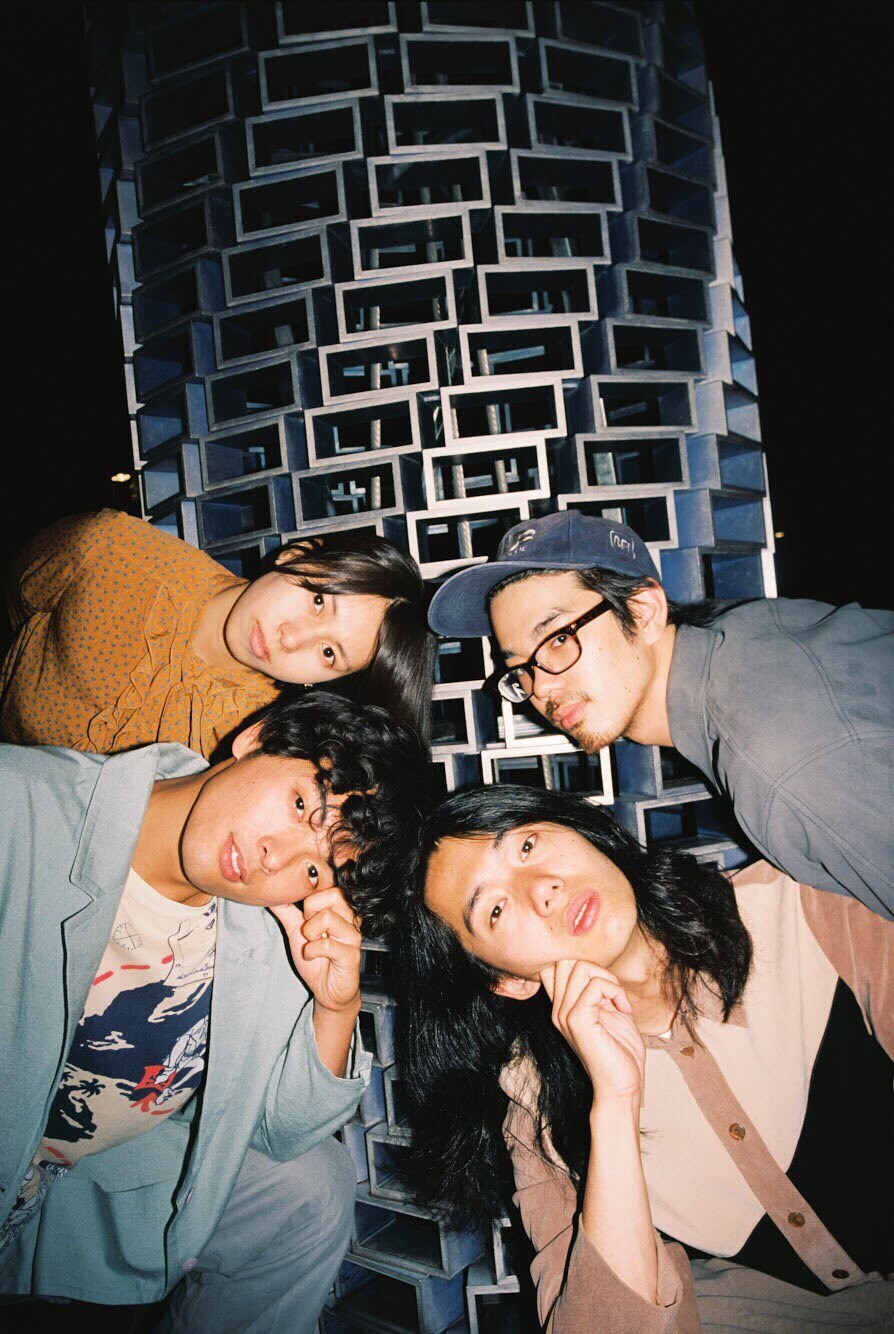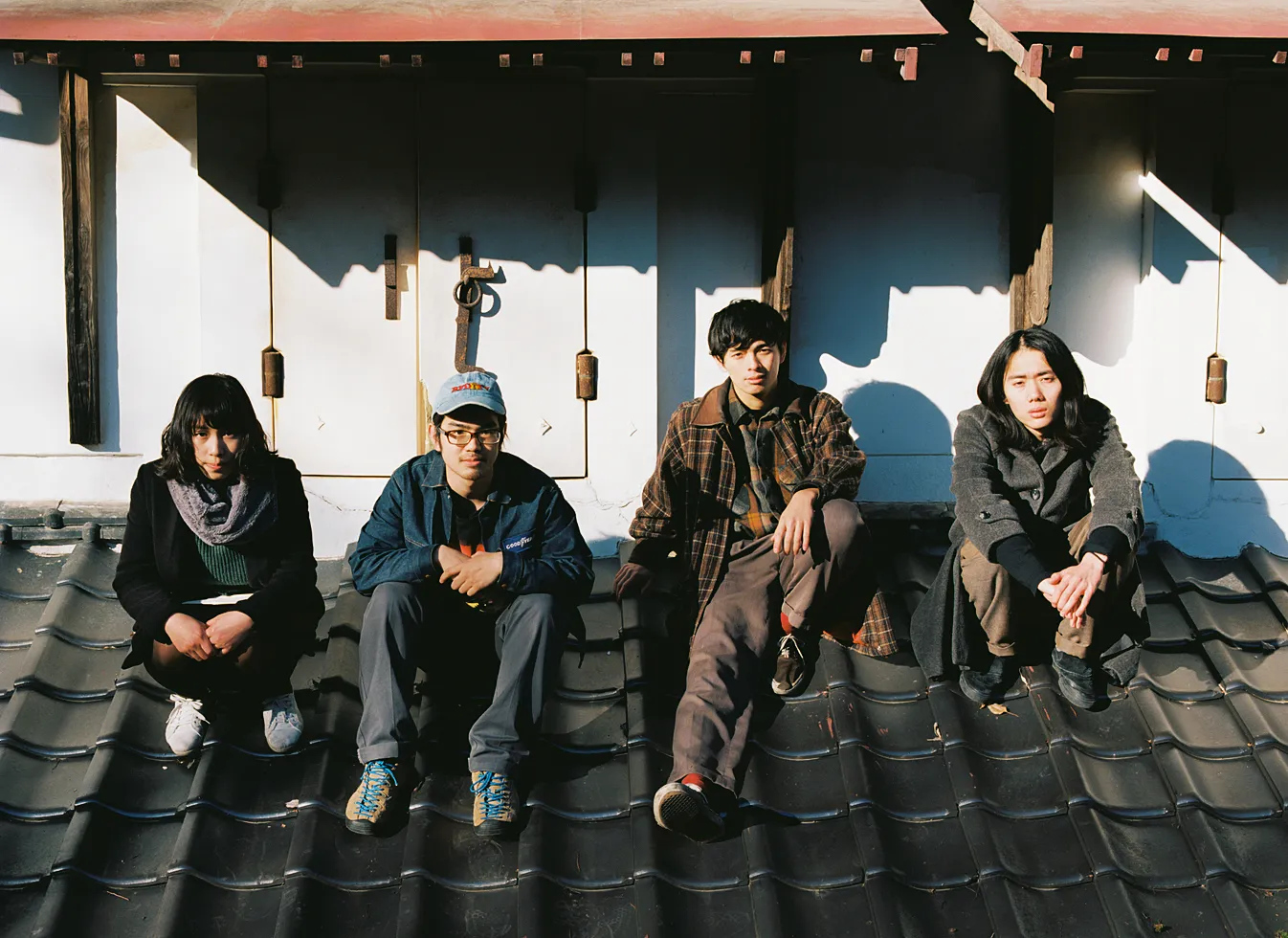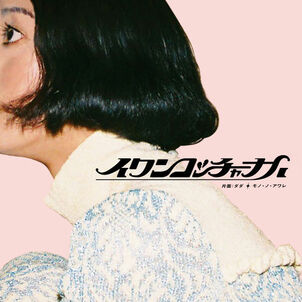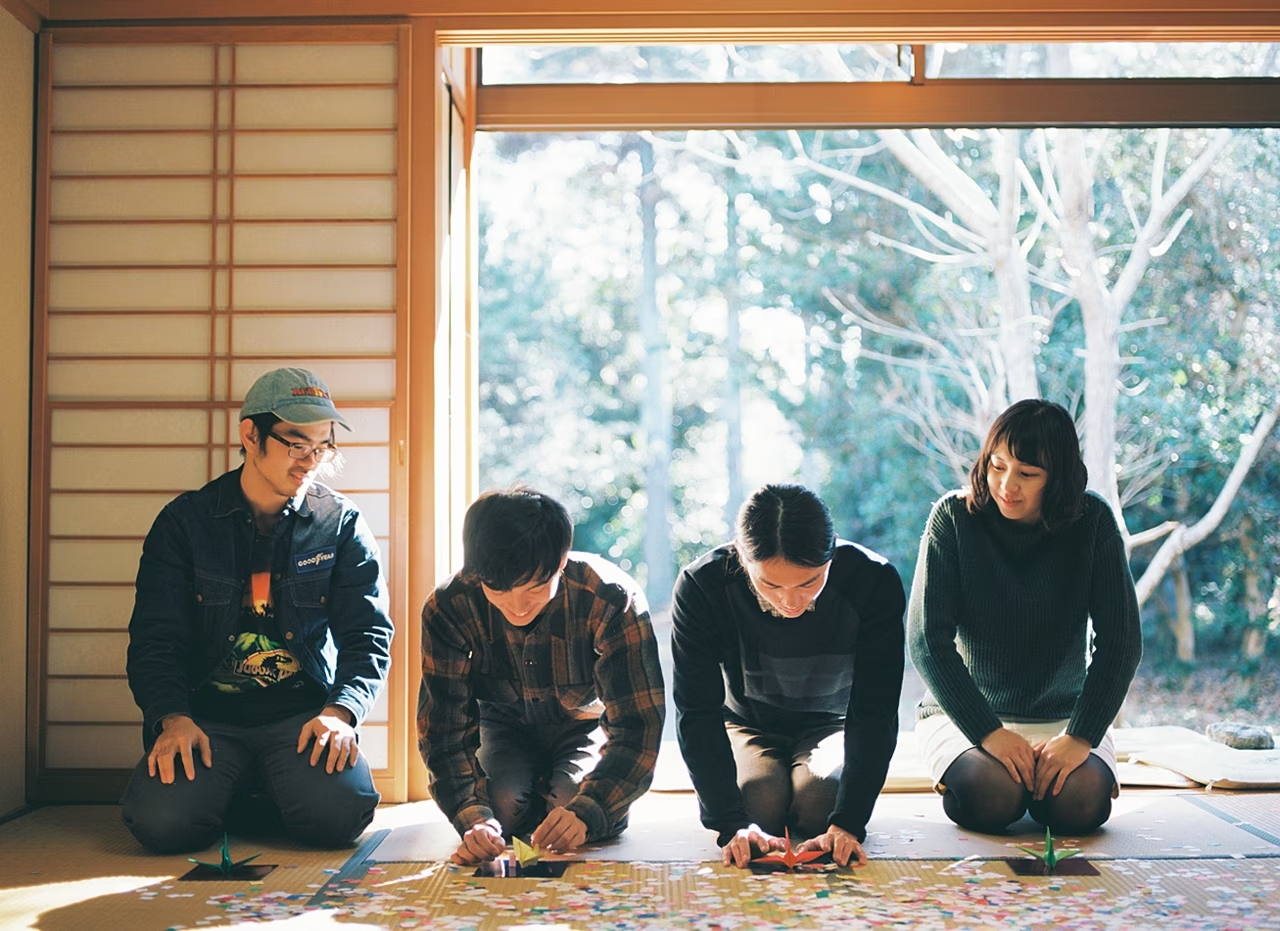Here is an interview with the cool youngsters of MONO NO AWARE. The interview focuses on the history of the band’s formation, as well as on their debut album. Enjoy!
Interview & text: Kaneko Atsutake (Japanese text)
English translation: Henkka
MONO NO AWARE links: Website, Instagram, Facebook, Twitter
Note: You can buy Jinsei, Yamaori Taniori on CDJapan.
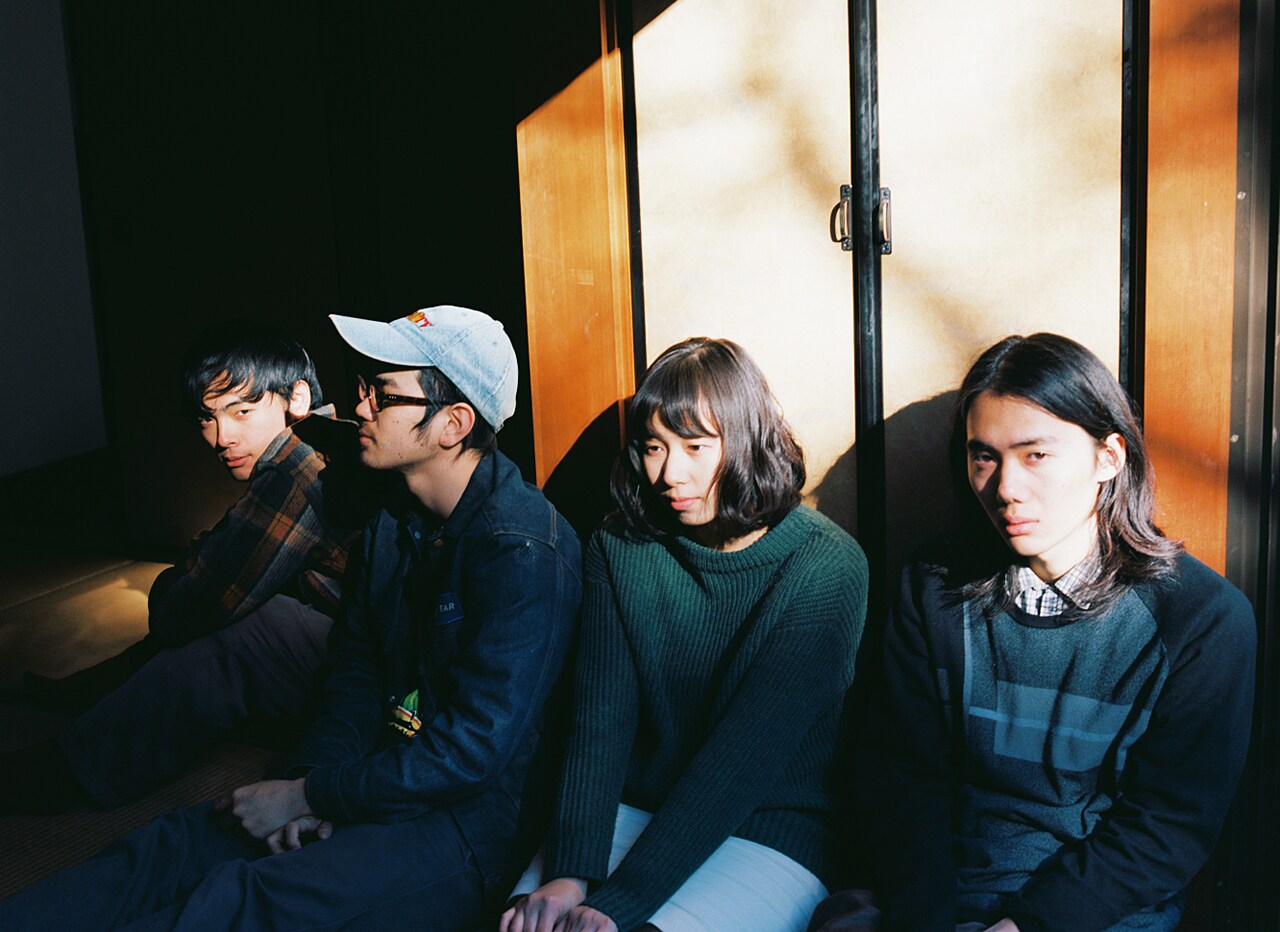
MONO NO AWARE
(L-R) Tamaoki Shukei, Yanagisawa Yutaka, Takeda Ayako, Kato Seijun
MONO NO AWARE, a four-piece band who derive their name from the concept of mono no aware—the natural transience of things and feelings experienced with respect to life’s subtleties—have released their debut album, Jinsei, Yamaori Taniori.
With overseas garage rock and post-punk as the backdrop, their music can be quite volatile, with daring changes that can occur even within individual songs. Another characteristic of the band—also apparent in the album’s title—is their wordplay, always causing involuntary smiles. While their music has some similarities with the currently trending psychedelic pop of the Tokyo indie scene (as showcased at the “BEACH TOMATO NOODLE” party co-hosted by Tempalay and domico), the band neatly avoids categorization, with their easygoing feel giving them a unique personality.
At the core of the band are its two Hachijojima natives: songwriter/vocalist/guitarist Tamaoki Shukei, and guitarist Kato Seijun. Tamaoki, the intuitive humanities type, and Kato, the research-oriented sciences type, complement each other nicely in their search for musical freedom, their aims simply set for “somewhere other than here.” Led by this duo—somehow reminiscent of Natsume Tomoyuki and Sugawara Shinichi of the Siamese Cats—now that they are “out of the well,” so to speak, what kinds of different worlds will this group be showing us next?
— First, could you tell us about how the band was first formed?
Kato Seijun (guitar): Me and Shukei are both from Hachijojima, and after we graduated from high school I went to university in Gunma while Shukei did so in Tokyo.
He’d always been writing songs from way back then, and so even after we made it over here we’d talk on the phone or on Skype and I was always telling him, “You need to start a band while you’re in university.” But then a year passed and still there was no change—he was still just sitting at home writing songs by himself. So I got impatient and said, “Fine, we’ll start a band together then.” And he went, “I’d been thinking the same thing!” (laughs)
— So it wasn’t your plan originally to start a band together once you’d moved to Tokyo?
Tamaoki Shukei (vocals/guitar): What with Seijun being over in Gunma and everything… We had no thoughts along those lines. But then because I just completely lacked the initiative to start a band with anyone else, after a year and change he just went, “Let’s do it together then.” Really, I had been thinking about asking him around the same time. I was like, “Guess it’s mutual love then, huh?“ (laughs)
— And then bassist Takeda (Ayako) happened to be a member of the same university club that Tamaoki was in, right?
Tamaoki: Seijun had immediately introduced me to our previous drummer, but we weren’t having any luck in finding a bassist… Or rather, I actually knew Takeda already—the problem was that I just couldn’t seem to ask her. (laughs)
But somehow I then mustered up the courage, and she just said, “Let me think about it.” She then proceeded to keep us waiting for three months.
Takeda Ayako (bass): I had been a member of high school’s band club, and I’d been planning on just doing it as a club thing in university as well. I wasn’t sure I liked the idea of playing outdoors and stuff. So I kept hesitating… And before I’d noticed, three months had passed. (laughs)
Tamaoki: You sure kept us waiting…
Takeda: Sorry. (laughs)
— Was the direction of the band any different when it was first formed?
Tamaoki: The stuff we were doing back then was more simple, akin to like 2000s J-rock. It’s not that we came to dislike that stuff either, but through the exchange of information between us members and what with me coming to listen to more UK rock, and later with (Yanagisawa) Yutaka—who could pull off all sorts of different drums patterns—joining the band around that time, our sound just changed.
Yanagisawa Yutaka (drums): We first started playing the song “Ido Sodachi” just around the time I joined, and it sounded so different from any of our other stuff. Looking back, it was a turning point for the band.
— You mentioned “J-rock.” Could you be more specific?
Tamaoki: People said we sounded like Supercar or Quruli. It was more “sparkly,” easy-to-understand, Pocari Sweat TV commercial type stuff. (laughs)
In the beginning, I was only listening to Japanese bands. I first started writing lyrics in junior high school, and my impetus for doing so was Noda Yojiro of RADWIMPS. His wordplay and just the immense scale of his lyrics all felt spot-on for me as a junior high schooler. Back then we would often do covers of like RADWIMPS and Fuji Fabric, so it’s possible my chord progressions were influenced by them.
— Supercar and Quruli themselves also have UK rock in their background. Maybe it’s only natural that you would head in that direction, too.
Tamaoki: My music listening habits can be pretty chaotic… It’d be impossible for me to explain it all step by step. But in my first year of university, a friend of mine just happened to be listening to the Arctic Monkeys’ “A Certain Romance,” and I thought it was so cool how the song starts with a dark-sounding intro but then quickly turns into something brighter. That’s when I started consciously listening to more Western music.
I wrote “Ido Sodachi” after that, and listening to it now the rhythm sounds like the Strokes or Phoenix, so I must’ve been listening to them around that time. I’m really not that knowledgeable about music myself, but the other members of the band are always checking out new stuff, and I feel like the music they introduce me to then leads to the songs I write.
— What is the origin story of your band name?
Tamaoki: I used to think the name “RADWIMPS” meant “God” until I realized how green I had been in my thinking. Anyway, I wanted our band name to have a double, even a triple meaning.
First, the meaning similar to author Yoshida Kenko’s whole thing about how “the flow of the river is always changing.” Second, the dictionary definition: “a deep, indescribable feeling.” And third, when you write “MONO” and “NO AWARE” in the Roman alphabet… It kind of looks like, “not aware of a particular thing.” (laughs)
Although, well, the most important reason was the fact that our songs are always changing. There are certain things that might be popular at any given time, like particular artists or—to give a current example—black music, and I don’t wish to be influenced by any sort of trends like that. I just want to go with the flow, or like, do exactly what I want to do, and write all kinds of different songs in the process.
I feel like all of that is expressed in the words “MONO NO AWARE.”
Yanagisawa: Personally, I think what makes a band interesting is to have a bunch of different sounds, much like with Quruli. I actually like black music myself, and I’ve always enjoyed listening to all kinds of different music. But in my case, it’s not so much that I’m trying to push my own tastes on MONO NO AWARE. Rather, I’m listening to different stuff just so I’m able to play something appropriate for the songs Shukei writes.
Takeda: I, too, like how we’re a variety of things. I don’t want us to mimic anyone else. I want people to feel that MONO NO AWARE is a bunch of different things.
Tamaoki: I think once you set the band’s musical direction in stone, it’s only going to lead to strain when you want to try and do something else. So really we’re just asking ourselves whether we’re enjoying ourselves, and if what we’re doing is something the audience, too, would enjoy. We’re just looking at that balance. I’d like people to think, “Wow, this band MONO NO AWARE, they sure do play all kinds of different stuff!”
To push that even further, I’d like for the music industry to become so that every band didn’t do just one specific genre, but rather just whatever it was they wanted to do. Although I am aware how that’d make things difficult on the business side of things. (laughs)
Yanagisawa: People do say we sound like a “compilation album.”
— But that’s exactly the sort of thing that makes bands like Quruli so interesting. Furthermore, as you were just saying in regards to your band name, I definitely feel like something that makes MONO NO AWARE so interesting is how any one given song can go in so many different directions.
Tamaoki: I’m someone who gets bored easily, so even with other bands I don’t really listen to the same songs too many times. I just get bummed out. Like… “The verse? Again? But I already heard this bit…” Obviously there are repetitions in our songs, too, but in our case it always comes from a place of, “I want to put some different lyrics here, so we’re gonna have to do this bit again.”
— So Takeda, what is your impression of Tamaoki’s songwriting?
Takeda: In a word…? It’s a pain. (laughs) Even at the demo stage the songs are really polished so that’s fun, but on the flip side it makes it that much harder to learn them.
Tamaoki: I always thought her root note playing sounded cool, and that’s actually why I invited her to join the band in the first place. But right now the bass lines are nothing like that… So, yeah, she’s very adaptable. (laughs)
— Although your songs vary in style, I feel like Kato’s playing—with his frequent use of all those memorable, single-sound phrases and repetitions—give the band personality. What kinds of guitarists do you like, Kato?
Kato: I generally don’t really love any of the, like… The guitarist types, you know? I like guys such as Manuel Göttsching—people with inquiring minds like that.
Although lately I actually find myself thinking I want to become a more proper guitarist myself. While the guitar phrases Shukei writes aren’t very “guitaristic,” my feeling is that audiences are still more taken in by playing that’s really “guitarist-esque.” So I’m going to try and play more like that in the future.
— Next, I’d like to ask you about specific songs. What was the original idea behind the album’s lead single, the dance number “Iwan Koccha nai“?
Tamaoki: With that one, it was… Wait, what was it actually?
Kato: Didn’t you used to get drunk and just sing, “iwan koccha naaai!“?
Tamaoki: Ah, right! A senior of mine covered the Virgins’ “Rich Girls” and it was really cool, so I was always singing it myself. Then, when I tried singing it on top of the song I was writing at the time, it just happened to fit perfectly.
— So the line was always “iwan koccha nai“?
Tamaoki: Yeah. I don’t speak English so to me it sounded like that’s what they were singing on “Rich Girls.” (laughs) Ever since I first wrote it, the verse always had the line, “Kimi ni kirawaretara doushiyou” (“What do I do if you come to dislike me?“), so I thought if I followed that up with the phrase, “Iwan koccha nai” (“I told you so!“), that would give it a kind of flirtatiousness. Or like, it’d make it into a story of someone who’s easily tempted. That’s also why the single’s cover art is so mature.
— “me to me,” on the other hand, is an immense psychedelic number.
Tamaoki: I happened to discover this band called Outfit on YouTube and I really dug their sense of rhythm, so I tried to write this one as a simple 4/4 affair. As far as the chords are concerned, a friend of mine taught me the DADGAD tuning, but I don’t have a great grasp of it so even now whenever I’m playing it I’m still just thinking, “What a weird tuning…” That’s probably what gives it that psychedelia. Or like, that strange ambience.
Yanagisawa: The intro drumming on the initial demo he sent me sounded like something that couldn’t possibly be played by a human, so I came up with my own pattern. As for the verse and interlude, I was hooked on Nujabes and other chill-out stuff at the time, so I cut the tempo in half there and tried to play it with a nuance of what I call “laid-back intensity.”
— While “me to me” is, as I understand it, about social networking services, the lyrics are basically fun wordplay mixed with the very day-to-day moments and scenes of… Well, mono no aware. Right?
Tamaoki: That’s about right. I wanted to take those sorts of indescribable scenes of life; those situations that can’t be expressed in words, and turn them into lyrics. In that sense, our band name really is fitting.
The world is full of songs about being dumped and feeling sad—”Iwan Koccha nai” for one—but I don’t like to risk my lyrics being too boring by writing them in too straightforward of a manner. I want to throw in a couple of jokes; something that at least makes you smile a little. Really, though, what I’m aiming to write are lyrics which, if you really read them carefully, they make you think… “Wait, so that’s what this song’s about!”
— Meanwhile, “Ido Sodachi” has as its motif a proverb: “The frog in the well knows nothing of the great ocean.”
Tamaoki: Me and Seijun came over here from Hachijojima, and Takeda and Yutaka, too, moved to Tokyo from the countryside. So when we were in our late teens, we all learned firsthand how there was still so much of the world out there that we didn’t know. Then, a couple of years back I thought, “Well, seeing as I lost my Tokyo cherry, I might as well lose my overseas cherry, too.” So me and some other guys from the island went on a trip abroad, and the footage we took on that trip ended up becoming the music video.
I really liked “You Are A Tourist” by Death Cab for Cutie at the time, and in that song there’s a lyric that goes like, “If the town you were born and raised in is causing you pain, then it’s time to go.” I really liked that line, and so I tried incorporating the intro of that song into the guitar solo of “Ido Sodachi.”
— The whole theme of “going out into the world“… Obviously there’s some overlap there with a band who are just about to have their CD debut themselves. Furthermore, on the last song, “Kakeochi,” you’re singing about wanting to go “somewhere not here,” bringing into mind the theme of escapism that’s often associated with psychedelia.
Tamaoki: “Let’s just get out there.” “Let’s go check out some new world.” I think those sorts of aspirations are something that are also present in quite a lot of our other songs that aren’t included on this album. I enjoy thinking about that theme. I also like Beatnik culture. That must be why our songs are filled with thoughts about rebellion against a society full of restrictions, and like, about a longing for a society that could never materialize in Japan.
— Do you think that might have something to do with your Hachijojima upbringing?
Kato: I do. The very first place I lived in after leaving the island was Gunma, and compared to back home I just thought Tokyo felt so loud and cramped. Also, you can find literally everything over here while on the island we had nothing, so even back then Shukei was always drawing and making movies by himself. He’s the kind of person who, if he feels like he has nothing to do, he’ll just create something himself. That’s also why I think he writes songs.
Conversely, I’m not that type of a person—I’m always just like modding games on Pro Action Replay.
— But then that ties into the discussion about your inquiring mind in regards to the guitar.
Tamaoki: Right. Seijun has only become more and more nerdy with time. (laughs) Even back in high school he’d spend all night watching anime and then sleep during class. He’s the type of person who, when he does get into something, he really dives in head first.
— I think you strike a great balance between you two, with the intuitive Tamaoki and the research-minded Kato.
Yanagisawa: True. These two do feel like they’re a set. That even goes for the songwriting, where Shukei creates the overall portrait which Seijun then refines for the ensemble.
Takeda: Seijun does have a good ear.
Tamaoki: Yeah. His ear is so good, even the recording engineers are intimidated by him.
Yanagisawa: It’s like Seijun is the one who actually realizes the mental images Shukei conjures up.
Tamaoki: Sometimes he’ll just miraculously come up with the exact sound I’d been looking for. Although the same also goes for Takeda and Yutaka of course.
— Tamaoki creates the demo with complete freedom, Kato tidies it up, and then the four of you build the final product together. This process must be what makes you MONO NO AWARE.
Tamaoki: I truly feel thankful to the other members. I genuinely think that without these members there would be no MONO NO AWARE.
